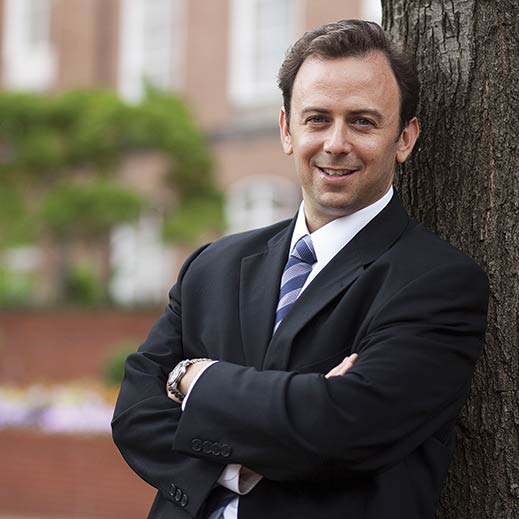That audio jack on your cell phone: who owns the intellectual-property rights to its design? Or the pattern of treads on your four-wheel-drive tires, which supposedly makes them rugged in rough terrain: can other companies imitate it? These are just two key patent questions that the U.S. International Trade Commission faced in the past year.

As a newly appointed member of the commission, F. Scott Kieff will confront issues like these. A leading expert on intellectual-property law, he’ll bring more than two decades of experience to bear on the commission’s work.
President Obama recognized that expertise when he nominated Kieff to the commission in the fall of 2012. In August, Congress approved the nomination unanimously.
“This is a chance to work with a lot of people from diverse perspectives who are very serious about the economics of trade and the way technology plays a role in trade,” says Kieff, who lives in Washington, D.C., with his wife and son.
Kieff is a proponent of strong patent protections. He finds inspiration in the opinions of judges Learned Hand, Jerome Frank, and Giles Sutherland Rich (for whom he worked as a law clerk) and the policies put in place under Presidents Carter and Reagan, who espoused such protections as a way to strengthen domestic production. Still, he recognizes the concerns large companies have about those who pursue patent protection for personal gain at the possible expense of innovation and progress.
Kieff has applied his expertise as director of the Project on Commercializing Innovation at Stanford’s Hoover Institution. In addition, he has served as a visiting professor of law at Stanford, the University of Chicago, and Northwestern and as a faculty fellow at Harvard. He is currently on leave from George Washington University Law School where he is the Fred C. Stevenson Research Professor.
Kieff also loves science and conducted research in molecular genetics at the Whitehead Institute during his time at MIT. That love may itself be encoded in the genes; his father is a Harvard professor of science and medicine.
“I have fond memories of my days as a practicing patent attorney,” he says. “Occasionally, I’d place a call to a Patent Office examiner about one of my dad’s patents and have to explain that there were two different Kieffs in the file. Dad was the inventor and I was the lawyer.”
Kieff continues to keep an eye on the work done at MIT, too.
“MIT has a very long tradition of being very introspective and honest about the costs and benefits of ways that technology can be used,” he says. “MIT is such an important place, not just to me, but to the world.”
Keep Reading
Most Popular
Large language models can do jaw-dropping things. But nobody knows exactly why.
And that's a problem. Figuring it out is one of the biggest scientific puzzles of our time and a crucial step towards controlling more powerful future models.
The problem with plug-in hybrids? Their drivers.
Plug-in hybrids are often sold as a transition to EVs, but new data from Europe shows we’re still underestimating the emissions they produce.
Google DeepMind’s new generative model makes Super Mario–like games from scratch
Genie learns how to control games by watching hours and hours of video. It could help train next-gen robots too.
How scientists traced a mysterious covid case back to six toilets
When wastewater surveillance turns into a hunt for a single infected individual, the ethics get tricky.
Stay connected
Get the latest updates from
MIT Technology Review
Discover special offers, top stories, upcoming events, and more.